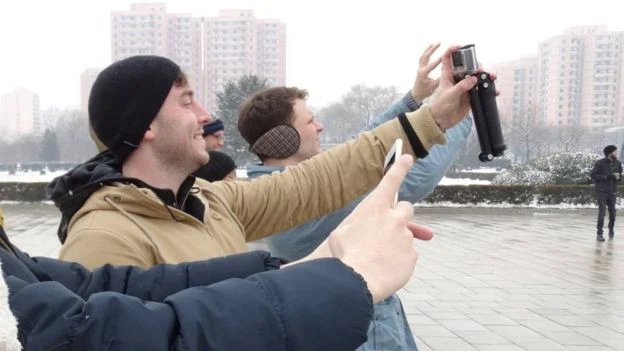Everyone in frame is smiling and laughing in the North Korean cold. Otto Warmbier, like the other tourists, launches a snowball, captured in slow motion on what appears to be a camera phone.
It's the kind of innocent fun you expect to be captured on a tour group holiday. Otto turns to his right, mouth wide open, laughing.
"This is the Otto I know and love. This is my brother," wrote Austin Warmbier, who released the video, which was shot during a three-night North Korea tour at the end of 2015.
Two months later, Otto would again appear on video, but in very different circumstances.
Head bowed and clutching a prepared "confession", the 21-year-old student walked out in front of North Korean TV cameras to speak, explaining why he had been arrested at the end of that tour, when everyone else had been allowed to leave.
Looming over him were the oversized portraits of North Korea's former supreme leaders, Kim Il-sung and Kim Jong-il.
He wore a cream-coloured jacket and tie. Before speaking, he got up an offered a low bow.
Otto thanked the North Korean government for the "opportunity to apologise for my crime, to beg for forgiveness and to beg for any assistance to save my life".
He said he tried to steal a propaganda sign from a hotel as a "trophy" for a US church with the "connivance of the US administration" in order to "harm the work ethic and motivation of the Korean people".
Later, he would break down in tears: "I have made the single worst decision of my life, but I am only human."
Otto is now back in the US after 15 months of captivity in North Korea. But he is in a coma, cannot understand language and has severe brain damage.
In the year-and-a-half since he threw that snowball, the life of a young man full of promise has been permanently altered.
Much remains unknown about how Otto's health deteriorated. Doctors at Cincinnati Medical Center say they have seen no sign he was physically abused but they and his family also don't buy North Korea's story that he contracted botulism and fell into a coma after taking a sleeping pill.
But how did a brilliant student from an Ohio suburb with hopes of becoming an investment banker end up imprisoned in a pariah state? And why was he released in a coma?
Homecoming king
The Warmbiers hail from a small suburb called Wyoming in Cincinnati, Ohio, where father Fred owns a small company.
Otto attended the best high school in the state, and was prom and homecoming king.
He was not only popular but also studious - he graduated as Salutatorian (the second-highest ranking student in his year) - and a talented athlete. His football coach has said he was a gifted player and a natural leader.
Otto went on to study economics and commerce with a minor in global sustainability at the University of Virginia and flourished there, according to the Washington Post.
The newspaper interviewed Otto's classmates at their graduation ceremony in May, where #FreeOtto stickers were handed out. The 22-year-old was in his third year of university when he was detained in North Korea. This should have been his graduation too.
Friends described him as a "sports fan who can reel off stats about seemingly any team, a friendly Midwesterner who can break down underground rap lyrics (and craft some of his own), a deep thinker who would challenge himself and others to question their place in the world, a guy from an entrepreneurial family who ate half-price sushi, an insatiably curious person with a strong work ethic and a delight in the ridiculous," the paper reported.
Otto is said to have known long before his college peers what he wanted to pursue as a career: investment banking.
According to his LinkedIn profile, he sat on the committee of a student investment fund and travelled to London in 2015 to complete a course in advanced econometrics at the London School of Economics.
His studiousness - and interest in travel - were what took him to Asia. Otto had been set to study at a university in Hong Kong on a study abroad programme in January 2016 and decided to stop in North Korea on the way.
He went through a China-based company called Young Pioneer Tours, which boasts of providing "budget travel to destinations your mother would rather you stayed away from".
'They decided to take an American'
Danny Gratton, from Staffordshire in the UK, shared a room with Otto during the three-night trip - they were the only two members of the tour group who were there on their own.
"From the second I met him we hit it off. He was very bright, intelligent and likeable," he told the BBC.
The night Otto is said to have tried to take the sign from within a staff-only area of the 1,000-room Yanggakdo International Hotel was New Year's Eve 2015, the second night of the tour.
Earlier, the group had taken a trip to the border with South Korea before returning, having a meal and taking a coach to Pyongyang's main square, where there was a big fireworks display. They had food and drank beer, Mr Gratton said.
However there was no rowdy behaviour - "It wasn't that sort of holiday," Mr Gratton said. "We toed the line." He said there was "no indication at all" that Otto had taken the hotel propaganda sign and he had not mentioned it.
The North Korean government has released grainy video footage showing a dark figure whose face cannot be seen removing a sign in a corridor.
Otto was taken away by guards as the pair went through immigration control at Pyongyang International Airport on 2 January 2016.
 AFP/GETTY
AFP/GETTY
"We were the last two people to go through passport control. We handed over our passports and the guy pointed at Otto and pointed to the door. Two security guards came over and ushered him away," said Mr Gratton.
"I made an ironic comment. I actually said 'Well we won't be seeing you again'. He sort of laughed at me and that was the last we saw of him.
"They made the decision to take an American. It was just his time, he was in the wrong place at the wrong time."
'Terrorised and brutalised'
Later, once the remaining group arrived in Beijing, one of the tour guides is reported to have spoken to Otto on the phone, who said he had a "severe headache and wanted to be taken to the hospital", the Post reports, citing another passenger.
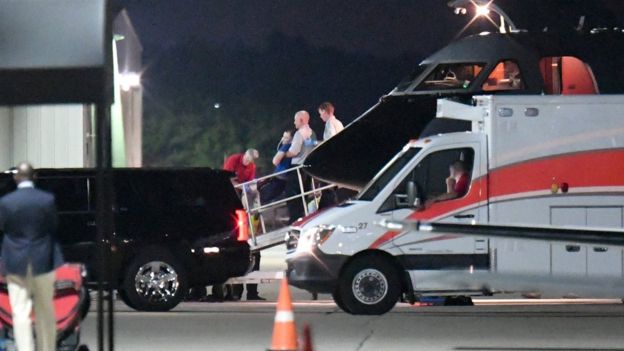 REUTERS
REUTERS
The BBC has contacted Young Pioneer Tours for comment.
North Korea only confirmed that Otto had been arrested weeks later, on 22 January. He gave his televised statement in late February and was given 15 years' hard labour, for crimes against the state, in March.
Observers said the sentence seemed unusually high for a foreigner and could be related to deepening tensions between North Korea and the US over the former's nuclear programme.
It's unclear what happened to Otto between his sentencing and the announcement of his release on 14 June by the US government.
But his father Fred says he slipped into the coma "the day after he was sentenced" - well over a year ago.
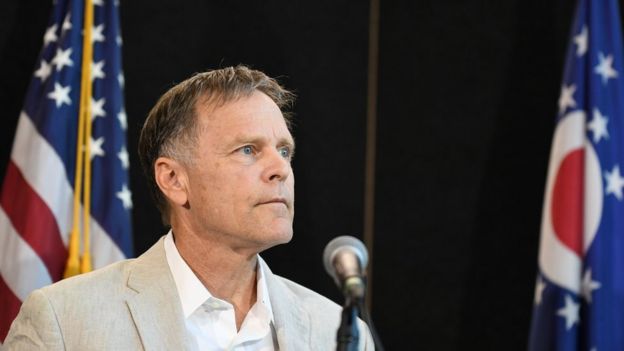 REUTERS
REUTERS
Speaking at a press conference wearing the same jacket worn by his son on the day he "confessed" in Pyongyang, he said the North Korean government had "brutalised and terrorised" Otto.
North Korea says it released him on "humanitarian grounds".
Intelligence agencies in the North might have kept the state of his health under wraps, including from top officials, out of fear, says Stephan Haggard, director of the Korea-Pacific Programme at the University of California, San Diego.
At some stage, someone would have realised "that the worst of all possible worlds is for the guy to die in custody", kickstarting a frantic diplomatic effort to get him out, he told the AFP news agency.
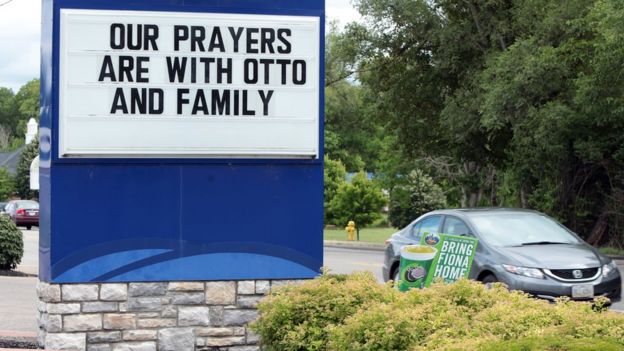 EPA
EPA
Dr Daniel Kanter, one of those looking after Otto in Cincinnati says he is in "a state of unresponsive wakefulness". He has not spoken but has "spontaneous eye opening and blinking", he said.
Respiratory arrest is believed to be the cause of the brain damage, but it remains unclear what caused it. There are no signs that Otto was beaten.
He is breathing on his own but has not spoken and, at the request of the family, doctors will not disclose a prognosis.
His family are happy he is "now home in the arms of those who love him", Fred Warmbier said. When the plane carrying Otto touched down on Tuesday evening, people gathered at the airport cheered.
"It's just been so long that he's been there that to hear he is actually coming home was incredible," his college roommate Emmett Saulnier told CNN before Otto arrived.
He was carried out with a tube attached to his nose, and sent straight to hospital by ambulance.
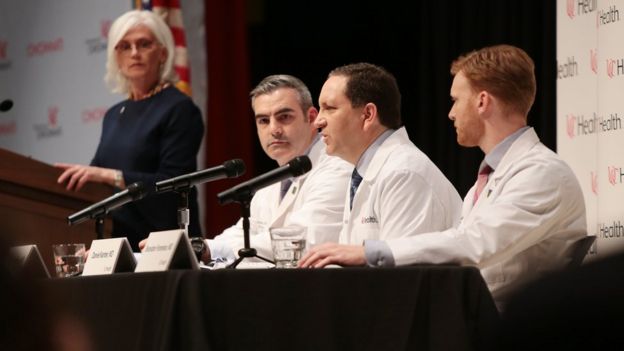 EPA
EPA
The University of Virginia welcomed his return, but President Teresa Sullivan said the community was "deeply concerned and saddened" to learn of his condition.
"When I knelt down by his side and I hugged him and I told him I missed him and I was so glad he made it home," Fred Warmbier said of what he did when he first saw his son.
"These things are tough to process but he's with us and we're trying to make him comfortable and we want to be a part of his life."
BBC NEWS





